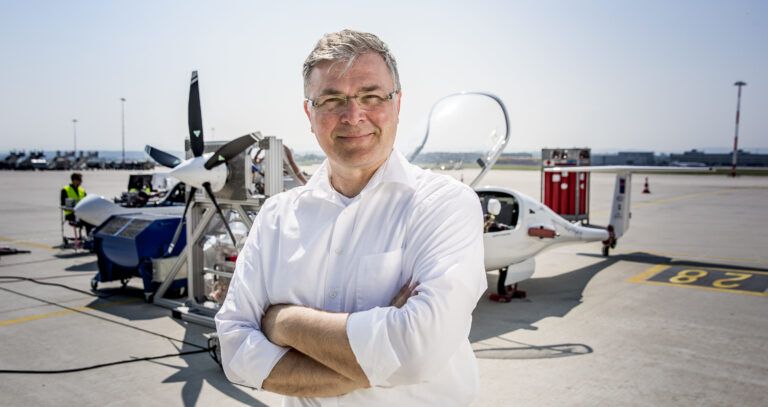Josef Kallo founded H2FLY in 2015 after running research projects on hydrogen fuel cell aircraft propulsion at the University of Ulm and the German Aerospace Center.
H2Fly has the aim of building, qualifying, and delivering the world’s first commercial hydrogen storage and fuel cell power system for aircraft. In 2021 the company was acquired by eVTOL aircraft developer Joby Aviation.
In September 2023, H2Fly completed the world’s first piloted flight of an electric aircraft powered by liquid hydrogen.
Kallo trained as an electrical engineer and is applying that expertise to the challenge of developing hydrogen-powered aircraft. At the University of Ulm he was the institute director for energy conversion and storage. Before then he oversaw electrochemical systems integration, including fuel cells, batteries and propulsion for aircraft at the German Aerospace Center (DLR). He also worked on EV fuel cells with General Motors.
Q: What has the test program achieved since the first flight last summer?
Our flight test campaign last year proved that it is possible to operate aircraft stably and reliably with fuel cells and liquid hydrogen. We have also gained experience in liquid hydrogen handling on the ground.
The focus of this year’s activities so far has been on advancements in technology development and ground testing of our proprietary H2F-175 powertrain.
Q: What are the next milestones or targets for the testing program?
Our next goal is the development of upscaled powertrain systems within the new BALIS 2.0 project. H2Fly is responsible for the development and set-up of the fuel cell system, which sees the output of the H2F-175 unit doubled from 175 kW to 340 kW.
The 350 kW system serves as a basic module to develop powertrain systems in the megawatt-class range.
Q: How much progress has been made towards the goal of a certified liquid hydrogen fuel cell propulsion system for aircraft?
While hydrogen technology holds phenomenal promise, key hurdles remain. These include the certification of the new powertrain and the development of dedicated airport infrastructure.
Currently, refueling presents a challenge. The absence of permanent hydrogen infrastructure forces companies like H2FLY to rely on expensive, temporary solutions.
A shift in investment focus towards renewable energies is crucial for producing sufficient green hydrogen.
Q: Why do you think hydrogen is the right fuel for aviation?
Liquid hydrogen’s exceptional energy density by weight and volume makes it ideal for extending range and payload capacity. Our breakthrough in efficiently conditioning liquid hydrogen enables optimal fuel cell use. Last summer’s flight demonstration showcased the full capabilities of our liquid hydrogen fuel cell powertrain.
Moreover, other sources such as SAFs (sustainable aviation fuels) remain a significant option for very long-distance flights, buying time for hydrogen technology and infrastructure to mature. SAF can, and should, play a transitional role here.
Q: What do you see as the biggest barrier to the widespread adoption of zero-emission aircraft?
Fossil fuels as we use them today are far too cheap. As with any innovative technological advancement, the world needs to grow in confidence, which then leads to acceptance.
A way to speed this process up is through government and expert acceptance, which we’re already starting to see through EU-funded research programs. However, there needs to be an increase in the money spent on R&D and infrastructure across the globe.
Other innovations such as AI will open the door to the custom design of hydrogen-powered aircraft and boost the overall architecture development. But there needs to be an increase in data being shared across research institutions, OEMs and airlines to break down barriers and enable collaborative problem-solving to ensure overall progress, and thus acceptance.





